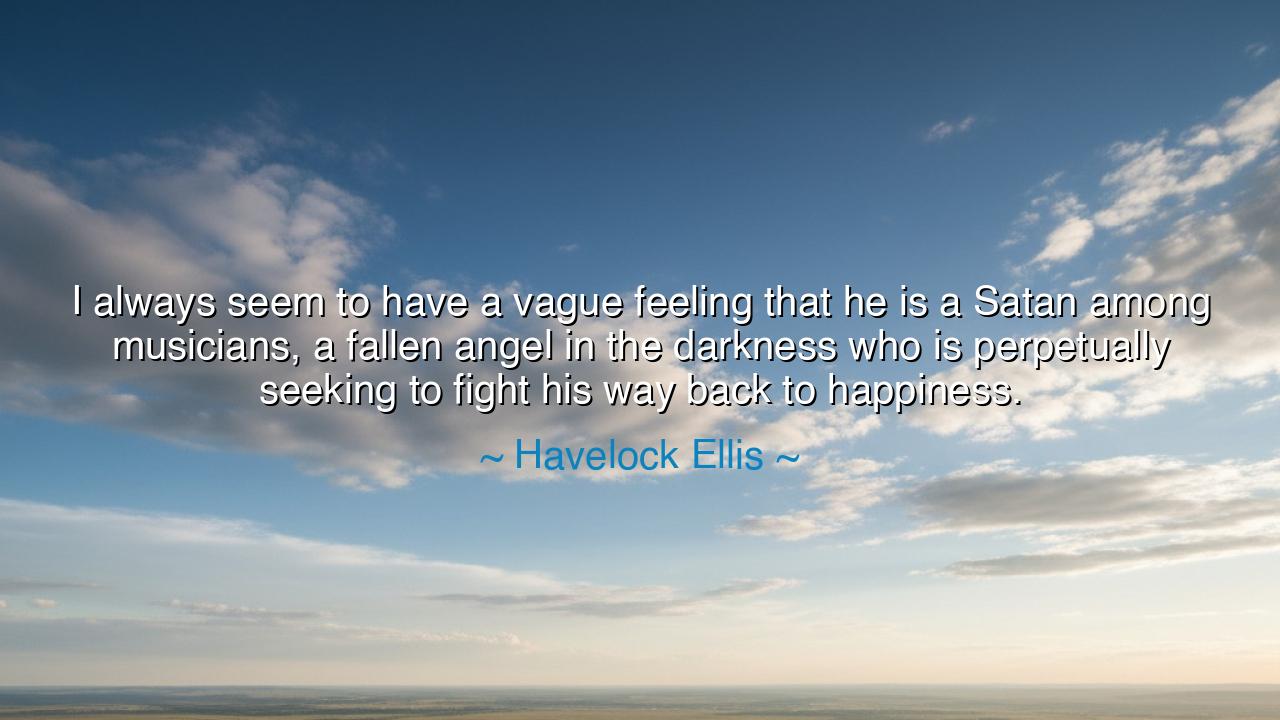
I always seem to have a vague feeling that he is a Satan among
I always seem to have a vague feeling that he is a Satan among musicians, a fallen angel in the darkness who is perpetually seeking to fight his way back to happiness.






In words woven from both reverence and awe, Havelock Ellis once confessed: “I always seem to have a vague feeling that he is a Satan among musicians, a fallen angel in the darkness who is perpetually seeking to fight his way back to happiness.” This line, heavy with myth and music, was written about the composer Franz Liszt—the virtuoso whose brilliance dazzled nineteenth-century Europe, whose genius straddled the divine and the demonic. Ellis, a psychologist and lover of art, saw in Liszt not just a musician, but a symbol — the eternal soul of man caught between darkness and light, sin and redemption, despair and beauty.
In this single sentence, Ellis paints the portrait of the fallen artist, the one who has glimpsed heaven through art but dwells amid the shadows of his own humanity. To call Liszt a “Satan among musicians” was not to accuse, but to marvel — for Satan, in ancient myth, was the angel who rebelled out of pride, who fell not because he hated the divine, but because he desired its glory too fiercely. So too, the artist of supreme genius often wrestles with the same paradox: the longing for perfection in an imperfect world, the hunger to touch eternity while bound to the flesh. Liszt’s music, rich with ecstasy and torment, was the very sound of this struggle — the soul’s “fight back to happiness.”
Havelock Ellis, a scholar of human desire and emotion, understood that such a struggle is not unique to artists, but universal to all who feel deeply. In Liszt, he saw the embodiment of the human condition — that restless striving of the spirit to reconcile passion and purity, power and peace. The “fallen angel” is every man or woman who dares to dream beyond the limits of their condition, who burns too brightly and suffers for it. It is the poet who loves too deeply, the thinker who questions too boldly, the dreamer who risks too much. These are the souls who fall not from evil, but from intensity — whose yearning for transcendence makes them both magnificent and wounded.
Indeed, history remembers many such “fallen angels.” Consider Ludwig van Beethoven, who, like Liszt, wrestled with divine fire. Deaf, isolated, and misunderstood, he poured into his symphonies the entire breadth of the human soul — from its darkest lament to its most radiant joy. His genius was both his crown and his cross. Or Vincent van Gogh, whose art was born from agony and faith, whose brush sought to pierce the veil of heaven but whose heart could not bear the weight of its own longing. These are the kindred spirits of whom Ellis spoke — those who battle the shadows within in pursuit of light without.
Ellis’s reflection, however, is not one of despair. The “fight back to happiness” is not futile; it is sacred. It reminds us that even in darkness, the soul still strives, still believes. The artist’s torment is not a curse but a testament — proof that beauty and truth are worth suffering for. To struggle toward happiness, even when surrounded by pain, is the highest act of courage. It is the human spirit defying its fall, refusing to surrender its wings.
And what of the rest of us, who may not wield brush or bow, yet carry within the same longing? Ellis’s words call to every heart that has stumbled and still seeks light. Each of us, in our own way, is both the fallen and the redeemed, the wanderer in shadow and the seeker of dawn. To live fully is to fall and rise again, to walk through sorrow and still reach for joy. The courage to “fight one’s way back to happiness” — that is the true measure of greatness.
Let this then be the teaching: do not fear your fall, nor despise your struggle. The one who wrestles with despair is closer to redemption than the one who never feels deeply enough to suffer. As Liszt fought through his storms to create music that touches eternity, so too must we transform our own darkness into light. For as Havelock Ellis reveals, even the fallen angel carries within him the echo of heaven — and it is through the fire of his struggle that his divine music is born.






AAdministratorAdministrator
Welcome, honored guests. Please leave a comment, we will respond soon